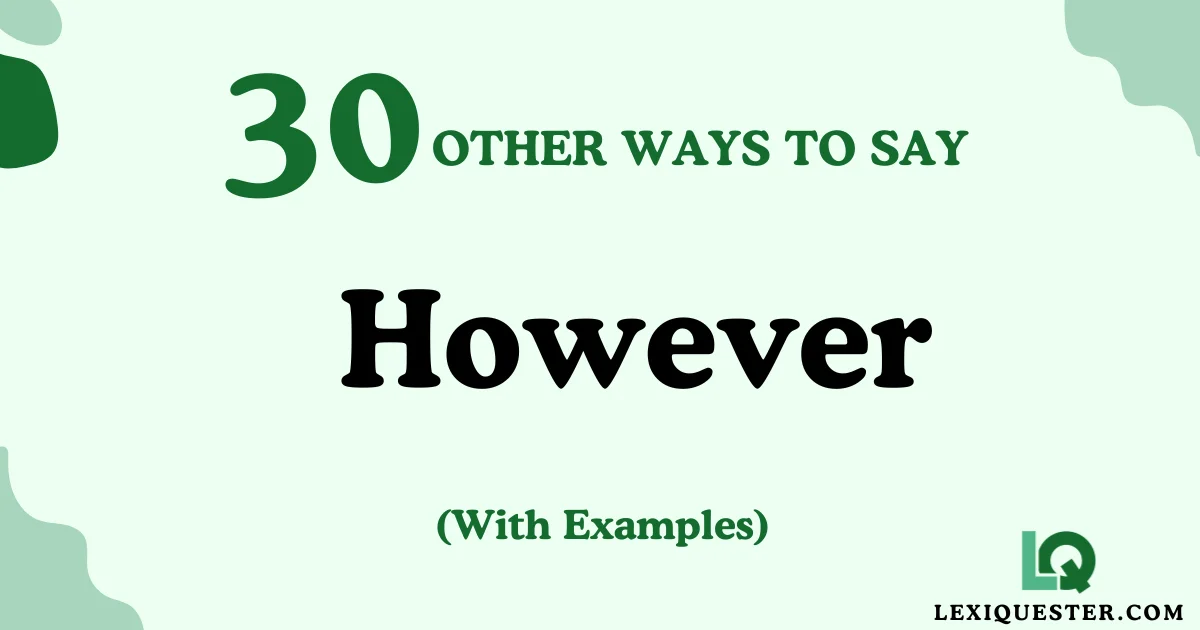Finding the right word can make all the difference in how our messages are received, especially when we want to convey warmth, care, and understanding. The word however is often used to signal contrast, but sometimes, using alternative phrases can soften a point and add a more personal touch. In this guide, we’ll explore 30 thoughtful ways to replace however, complete with meanings, examples, and explanations to help you communicate with empathy and nuance.
What Does “However” Mean?
However is commonly used to introduce a contrasting idea or exception. It’s a transitional word that signals to readers that a shift in thought is coming. While effective, it can sometimes sound formal or abrupt, which is why finding softer alternatives can help convey empathy or understanding in more sensitive communication.
When to Use “However”
However can be used when you need to highlight a contrast or introduce an exception. It’s ideal for written communication in both professional and personal settings. If you’re discussing something complex or want to express care, using a more nuanced word can help soften the message while still conveying the needed contrast.
Is It Professional/Polite to Say “However”?
Yes, however is polite and professional. In formal writing, it’s often preferred. But when trying to be more approachable or conversational, softer alternatives may feel more caring or inclusive, making them a better choice in certain contexts.
However Synonym:
- Nevertheless
- Nonetheless
- On the Other Hand
- Still
- Yet
- Even So
- Though
- In Contrast
- Conversely
- Then Again
- In Any Case
- That Said
- At the Same Time
- All the Same
- Be That as It May
- Even Though
- With This in Mind
- Despite This
- All Things Considered
- On the Contrary
- Rather
- In Light of That
- Whereas
- Regardless
- Albeit
- But
- Instead
- Otherwise
- Still and All
- With That
1. Nevertheless
- Meaning: Regardless of what was previously stated
- Tone: Neutral to formal
- Example: “The results were disappointing. Nevertheless, we gained valuable insights.”
- Definition: Used to introduce a fact that contrasts with what was previously mentioned.
- Explanation: Perfect for emphasizing persistence or moving forward despite challenges.
2. Nonetheless
- Meaning: In spite of what has been said
- Tone: Professional, neutral
- Example: “It was a tough decision. Nonetheless, it was necessary.”
- Definition: Often used to add a point that softens or balances a statement.
- Explanation: Helps acknowledge the difficulty without negating the previous point.
3. On the Other Hand
- Meaning: Looking at the opposing side of an issue
- Tone: Conversational, balanced
- Example: “She’s inexperienced. On the other hand, she’s highly motivated.”
- Definition: Used to introduce a different perspective.
- Explanation: This phrase is helpful for presenting alternatives or contrasting ideas in a softer tone.
4. Still
- Meaning: Despite previous points, something remains true
- Tone: Simple, direct
- Example: “We haven’t met the target. Still, progress has been steady.”
- Definition: Emphasizes an enduring quality or ongoing situation.
- Explanation: Adds continuity while signaling contrast, ideal for brief statements.
5. Yet
- Meaning: Even so, despite that
- Tone: Casual to formal
- Example: “The proposal has flaws. Yet, it offers unique benefits.”
- Definition: A shorter alternative often used in both speech and writing.
- Explanation: Useful for adding contrast in a single word for brevity and emphasis.
6. Even So
- Meaning: Despite that, in consideration of the circumstances
- Tone: Warm, considerate
- Example: “The team was under-resourced. Even so, they delivered.”
- Definition: Adds a sense of acknowledgment before expressing contrast.
- Explanation: Shows empathy while highlighting resilience or achievement.
7. Though
- Meaning: Despite the previous statement
- Tone: Neutral, adaptable
- Example: “The weather was poor. Though, we still enjoyed the event.”
- Definition: Often used in spoken and informal writing.
- Explanation: Adds contrast in a conversational way without formality.
8. In Contrast
- Meaning: In opposition to the prior point
- Tone: Formal, objective
- Example: “The first design is minimal. In contrast, the second is bold.”
- Definition: Highlights a distinct difference in qualities.
- Explanation: Best used for clearly contrasting two specific points.
9. Conversely
- Meaning: Introducing the opposite idea
- Tone: Formal, analytical
- Example: “She prefers routine. Conversely, he thrives on change.”
- Definition: Used to show a mirrored, opposite relationship.
- Explanation: Perfect for more analytical or structured discussions.
10. Then Again
- Meaning: Considering another viewpoint or option
- Tone: Casual, reflective
- Example: “It’s far. Then again, the scenery is worth it.”
- Definition: Often used when reconsidering or presenting a flip side.
- Explanation: Creates a moment for reflection and reconsideration.
11. In Any Case
- Meaning: Regardless of previous points
- Tone: Neutral to casual
- Example: “We’ve had delays. In any case, the work is almost done.”
- Definition: Used to conclude or shift away from previous concerns.
- Explanation: Offers a wrap-up that moves beyond challenges.
12. That Said
- Meaning: Given what’s been mentioned
- Tone: Reflective, conversational
- Example: “It’s a new venture. That said, we’re hopeful.”
- Definition: Introduces a balancing point after initial statements.
- Explanation: Perfect for adding thoughts that temper or add perspective.
13. At the Same Time
- Meaning: Considering both sides simultaneously
- Tone: Balanced, thoughtful
- Example: “The budget is limited. At the same time, we want high-quality results.”
- Definition: Used to acknowledge two sides of an issue in parallel.
- Explanation: This phrase emphasizes equal consideration of both points, making it ideal for situations requiring balance.
14. All the Same
- Meaning: Regardless of what’s been said
- Tone: Friendly, neutral
- Example: “He’s new to the team. All the same, his ideas are impressive.”
- Definition: Suggests that, despite prior points, a following statement remains relevant.
- Explanation: Often used to keep the tone friendly while noting a contrast.
15. Be That as It May
- Meaning: Accepting a point but introducing another view
- Tone: Formal, detached
- Example: “She’s talented. Be that as it may, experience is key for this role.”
- Definition: A phrase that gently introduces a contrast without dismissing the previous point.
- Explanation: Adds a degree of formality and respect when acknowledging differing ideas.
16. Even Though
- Meaning: Despite the previous fact
- Tone: Neutral, straightforward
- Example: “We faced setbacks. Even though, the outcome was favorable.”
- Definition: Emphasizes resilience or overcoming a challenge despite prior circumstances.
- Explanation: This phrase is ideal for adding strength to a positive outcome.
17. With This in Mind
- Meaning: Taking into consideration the prior point
- Tone: Reflective, careful
- Example: “The requirements are strict. With this in mind, we’ve simplified the process.”
- Definition: Adds a thoughtful note, preparing the reader for a related suggestion or solution.
- Explanation: Useful for drawing conclusions that are mindful of previous information.
18. Despite This
- Meaning: In spite of the previous statement
- Tone: Neutral to formal
- Example: “Attendance was lower than expected. Despite this, the event was a success.”
- Definition: Highlights that a positive or ongoing aspect persists, despite setbacks.
- Explanation: Works well to emphasize a continuation or triumph over challenges.
19. All Things Considered
- Meaning: Weighing all aspects or viewpoints
- Tone: Thoughtful, objective
- Example: “There were challenges along the way. All things considered, the project went smoothly.”
- Definition: Conveys a balanced perspective that acknowledges all factors.
- Explanation: A good phrase for wrapping up points or making balanced conclusions.
20. On the Contrary
- Meaning: Opposite to what was previously suggested
- Tone: Strong, formal
- Example: “Some think it’s simple. On the contrary, it requires expertise.”
- Definition: Emphasizes a complete contradiction to the previous statement.
- Explanation: Great for when a point needs clear contrast and assertive phrasing.
21. Rather
- Meaning: Indicates a preference for an alternative
- Tone: Polite, soft
- Example: “It wasn’t a failure. Rather, it was a learning experience.”
- Definition: Often used to soften a correction or provide a different angle.
- Explanation: Adds a gentle redirection, making it ideal for softening a contrast.
22. In Light of That
- Meaning: Considering the prior point
- Tone: Neutral, slightly formal
- Example: “The cost is high. In light of that, we’ll seek additional funding.”
- Definition: Used to present an idea that aligns with or adapts to previous information.
- Explanation: This phrase is perfect for thoughtful adjustments or planning.
23. Whereas
- Meaning: Comparing two different aspects or ideas
- Tone: Objective, formal
- Example: “The first option is costly, whereas the second is budget-friendly.”
- Definition: Directly contrasts two ideas or options.
- Explanation: Ideal for structured comparisons, especially in analytical writing.
24. Regardless
- Meaning: Despite the situation
- Tone: Neutral, straightforward
- Example: “There were warnings. Regardless, we proceeded.”
- Definition: Indicates that an action was taken in spite of the prior point.
- Explanation: Adds resolve or determination in light of challenges.
25. Albeit
- Meaning: Although, even if
- Tone: Formal, concise
- Example: “The meeting was productive, albeit lengthy.”
- Definition: A compact way to acknowledge a condition while making a positive point.
- Explanation: Ideal for maintaining brevity while contrasting slightly.
26. But
- Meaning: Introducing an opposing idea
- Tone: Simple, direct
- Example: “It’s a high-quality product, but it’s expensive.”
- Definition: The simplest way to signal contrast.
- Explanation: Great for informal settings where clarity is more important than nuance.
27. Instead
- Meaning: In place of the previous option
- Tone: Firm, straightforward
- Example: “We expected higher turnout. Instead, numbers dropped.”
- Definition: Used to indicate a shift in expectation.
- Explanation: Works well for highlighting unexpected outcomes or alternatives.
28. Otherwise
- Meaning: In other circumstances
- Tone: Neutral, conversational
- Example: “We’ll proceed, otherwise, we may fall behind.”
- Definition: Introduces a possible consequence or alternative.
- Explanation: Useful for offering contingencies or alternate options.
29. Still and All
- Meaning: Regardless, even so
- Tone: Casual, reflective
- Example: “It was risky. Still and all, it was worth it.”
- Definition: Combines a reflective pause with persistence.
- Explanation: Perfect for friendly or informal settings with a touch of warmth.
30. With That
- Meaning: Considering the prior point, we conclude or move on
- Tone: Reflective, gentle
- Example: “It’s a complex process. With that, let’s take the next step.”
- Definition: A closing remark that transitions smoothly.
- Explanation: Ideal for gently concluding or preparing for a next step.
Conclusion
Choosing the right word can change how your message feels to others, especially when contrasting points are made. Whether in personal or professional settings, using these alternatives to however can add warmth, clarity, and depth to your communication, ensuring that your message resonates with care.
Recent Posts
- 30 Other Ways to Say “How Cool” (With Examples)
- 30 Other Ways to Say “Not Only” (With Examples)
- 30 Other Ways to Say “I’m Sorry for Your Loss” (With Examples)
- 30 Other Ways to Say “I Look Forward to Meeting You” (With Examples)
- 30 Other Ways to Say “Happy Married Life” (With Examples)
- 30 Other Ways to Say “Thank You for Letting Me Know” (With Examples)














